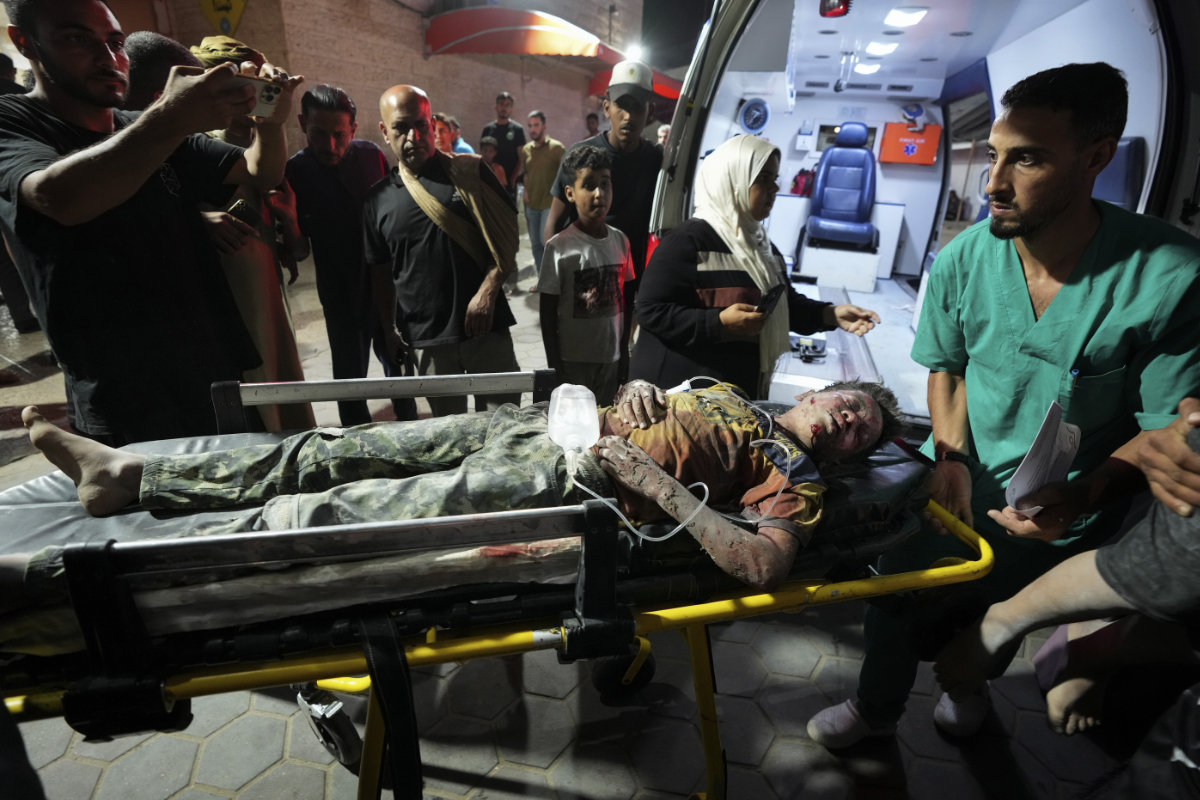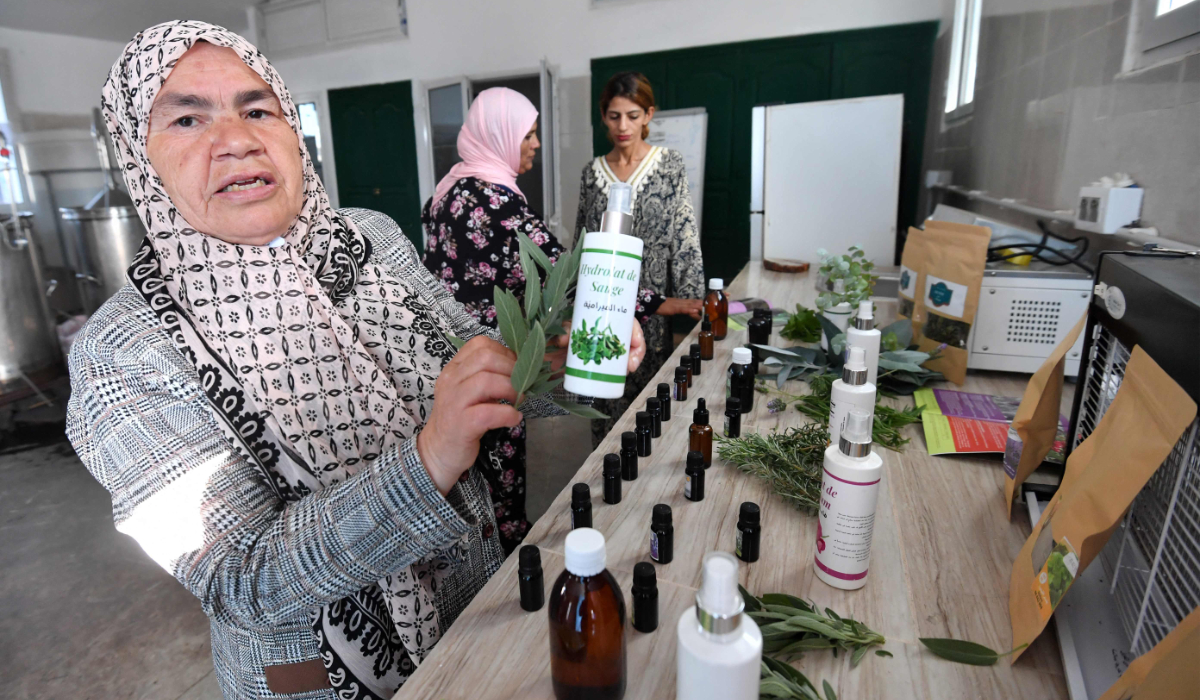DEIR AL-BALAH: Palestinian health workers said Israeli airstrikes killed at least 45 people Sunday and hit tents for displaced people in the southern Gaza city of Rafah, and “numerous” others were trapped in flaming debris. Gaza’s Health Ministry said women and children made up most of the dead and dozens of wounded.
The attacks came two days after the International Court of Justice ordered Israel to end its military offensive in Rafah, where more than half of Gaza’s population had sought shelter before Israel’s incursion earlier this month. Tens of thousands of people remain in the area while many others have fled.
Footage from the scene of the largest airstrike showed heavy destruction. Israel’s army confirmed the strike and said it hit a Hamas installation and killed two senior Hamas militants. It said it was investigating reports that civilians were harmed. Defense Minister Yoav Gallant was in Rafah on Sunday and was briefed on the “deepening of operations” there, his office said.
The United Nations Palestinian refugee agency, UNRWA, said on Monday that reports of attacks on families seeking shelter in Rafah in the southern tip of the Gaza Strip were "horrifying".
“Information coming out of Rafah about further attacks on families seeking shelter is horrifying," UNRWA wrote on X.
"There are reports of mass casualties including children and women among those killed. Gaza is hell on earth. Images from last night are yet another testament to that."
Palestinian health and civil emergency service officials said on Sunday Israeli air strikes killed at least 35 Palestinians and wounded dozens in an area in the southern Gaza Strip city of Rafah designated for the displaced.
The Israeli military said its air force struck a Hamas compound in Rafah, and that the incident was under review.

A Palestinian wounded in an Israeli bombardment on the Gaza Strip is brought to Al Aqsa hospital in Deir al Balah, central Gaza Strip, on May 26, 2024. (AP)
A spokesperson with the Palestinian Red Crescent Society said the death toll was likely to rise as search and rescue efforts continued in Rafah’s Tal Al-Sultan neighborhood about two kilometers (1.2 miles) northwest of the city center.
The society asserted that the location had been designated by Israel as a “humanitarian area.” The neighborhood is not included in areas that Israel’s military ordered evacuated earlier this month.
The airstrike was reported hours after Hamas fired a barrage of rockets from Gaza that set off air raid sirens as far away as Tel Aviv for the first time in months in a show of resilience more than seven months into Israel’s massive air, sea and ground offensive.
There were no reports of casualties in what appeared to be the first long-range rocket attack from Gaza since January. Hamas’ military wing claimed responsibility. Israel’s military said eight projectiles crossed into Israel after being launched from Rafah and “a number” were intercepted, and the launcher was destroyed.
Earlier Sunday, dozens of aid trucks entered Gaza from southern Israel under a new agreement to bypass the Rafah crossing with Egypt after Israeli forces seized the Palestinian side of it earlier this month. Israel’s military said 126 aid trucks entered via the nearby Kerem Shalom crossing.
But it was not immediately clear if humanitarian groups could access the aid — including medical supplies — because of fighting. The crossing has been largely inaccessible because of Israel’s offensive in Rafah. United Nations agencies say it is usually too dangerous to retrieve the aid. The World Health Organization last week said an expanded Israeli incursion in Rafah would have “disastrous” impact.”
“With the humanitarian operation near collapse, the secretary-general emphasizes that the Israeli authorities must facilitate the safe pickup and delivery of humanitarian supplies from Egypt entering Kerem Shalom,” the spokesperson for UN chief Antonio Guterres said in a statement.
Egypt refuses to reopen its side of the Rafah crossing until control of the Gaza side is handed back to Palestinians. It agreed to temporarily divert traffic through Kerem Shalom, Gaza’s main cargo terminal, after a call between US President Joe Biden and Egyptian President Abdel Fattah El-Sisi.Egypt on Monday condemned what it called the "deliberate bombardment by Israeli forces of displaced peoples' tents" in Rafah, in strikes which Gaza's civil defence agency said killed at least 45 people.
The Egyptian Foreign Ministry issued a statement calling on Israel to "implement the measures ordered by the International Court of Justice (ICJ) concerning an immediate cessation of military operations" in Rafah.
The war between Israel and Hamas has killed nearly 36,000 Palestinians, according to Gaza’s Health Ministry, which does not distinguish between civilians and fighters in its count. Israel blames civilian deaths on Hamas because the militants operate in dense, residential areas.
Around 80 percent of Gaza’s 2.3 million people have fled their homes, severe hunger is widespread and UN officials say parts of the territory are experiencing famine.
Hamas triggered the war with its Oct. 7 attack into Israel, in which Palestinian militants killed some 1,200 people, mostly civilians, and seized some 250 hostages. Hamas still holds some 100 hostages and the remains of around 30 others after most of the rest were released during a ceasefire last year.
Israeli Prime Minister Benjamin Netanyahu has said Israel must take over Rafah to eliminate Hamas’ remaining battalions and achieve “total victory” over the militants, who recently regrouped in other parts of Gaza.
The war has also heightened tensions in the Israeli-occupied West Bank. Palestinian authorities on Sunday said Israeli forces shot dead a 14-year-old boy near the southern West Bank town of Saeer. The Israeli army said the Palestinian male was shot dead after trying to stab Israeli forces at Beit Einun Junction.
Southern Gaza largely cut off from aid
Southern Gaza has been largely cut off from aid since Israel launched what it called a limited incursion into Rafah on May 6. Since then over 1 million Palestinians, many already displaced, have fled the city.
Northern Gaza receives aid through two land routes that Israel opened during global outrage after Israeli strikes killed seven aid workers in April.
A few dozen trucks enter Gaza daily through a US-built floating pier, far below the 150 trucks a day that officials hoped for. Aid groups say 600 trucks a day are needed.
Israeli man detained over mutiny threat
Israel’s military said it had detained a suspect over a widely circulated video in which a man dressed as a soldier threatens mutiny. The man says tens of thousands of soldiers were ready to disobey the defense minister over his suggestion that Palestinians should govern Gaza after the war, and pledged loyalty to Netanyahu alone.
Israeli military spokesman Rear Adm. Daniel Hagari said the man has been removed from reserve duty. It was not clear when or where the video was made. The prime minister’s office released a brief statement condemning all forms of military insubordination.
With Agencies







































